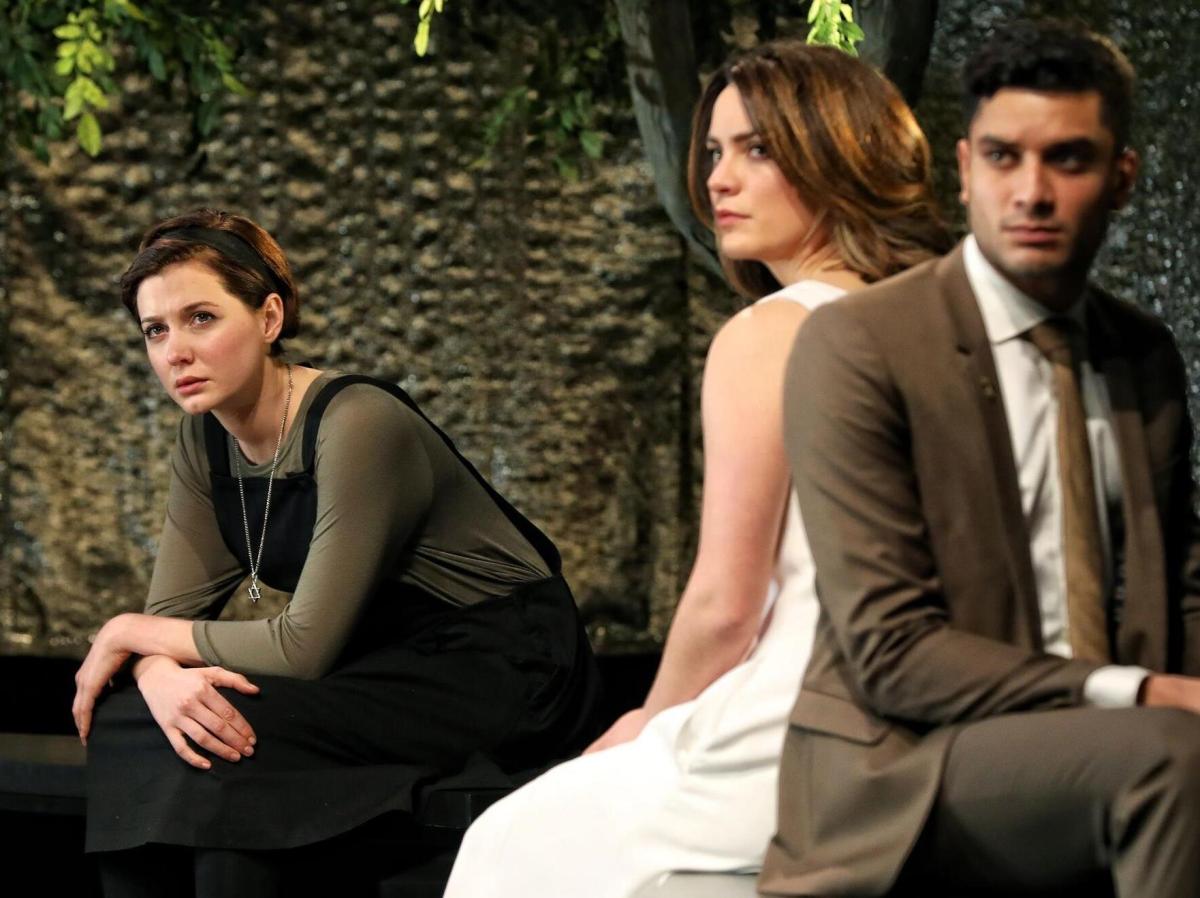Felicity McKay, Jessica Tovey and Shiv Palekar in Bell Shakespeare’s The Merchant of Venice, photograph by Prudence Upton.
Bell Shakespeare’s The Merchant of Venice is a glittering piece of theatre – even a triumph but therein lies a perplexing conundrum. Because, on the face of it, this tragic-comedy by William Shakespeare is one, if not the, most difficult of all his plays to comprehend.
It’s blatant and relentless racism – Nazi Germany used it as anti-semitic propaganda in countless popular productions – and the brutality in rendering a Jewish man symbolic of what Elizabethans saw as treasonous insatiable butchers is hard, no, down right uncomfortable to watch in an era of supposed equality and multiculturalism.
That’s where this production soars, and breaks its chains from the complicated remnants of its dark past.
The sum of its parts: forbidden love; homosexual love; the means by which one obtains love; the battle of the sexes; revenge and a social hierarchy built on those who have, and those who do not.
Mixed with bawdy, farcical humour and lyrical poetry, this production reveals what Shakespeare might have intended.
Here is a world that hates the Jew and privileges the Christian. As living breathing witnesses to the plight of one man’s fate this production teaches us much about the deeply divided world in which we live – unaffected if we are, of course, one of the haves, and do not belong to the others among us. Some of the haves get more than the others, but the abiding rule of law here is: do not step outside of the line unless you belong to a majority ruling class.
Shylock, a moneylender – one of the few restricted roles afforded to a Jew in Venice circa 1590 – is played brilliantly by Mitchell Butel.
Butel plays this noble man with such pathos and dignity that we cannot deny his worth – nor his logic when seeking revenge. His ‘hath not a Jew eyes’ speech is heart-wrenchingly poignant and filled with despair.
Antonio, who takes a loan of 3000 ducats from Shylock so that his young friend Bassanio (played with an eager, lovesick and loyal enthusiasm by Damien Strouthos) can marry his beloved Portia. Jo Turner fills Antonio with the bitterness of deeply sustained unfulfilled longing, and a haughtiness that he transforms effortlessly into torment at his own ill fated fortunes, which ultimately expands his ugly spiteful side. When Antonio defaults on the loan Shylock wants his bond, and so a play on power and privilege begins.
As Shylock’s daughter Jessica, Felicity McKay is all grace sweetness and light until she finds a kindred spirit in the Christian born Lorenzo (played by a charming lover in Shiv Palekar) and then she reveals a more duplicitous side.
The rest of the cast complement each other expertly. Jessica Tovey as Portia is equal parts vulnerable, crafty and entitled. We see early shades of Portia’s mercurial nature when she derides one of her suitors – the arrogant Moroccan Prince (also played by Palekar). Portia is witty, but also filled with malice. Her courtroom demands for Shylock to show mercy to the merchant Antonio are completely hypocritical.
The speed dating scenes allows the comedy to flourish and Portia’s maid and courtroom counterpart, Nerissa, played by Catherine Davies is hilariously ribald as she directs Portia’s admirers.
Eugene Gilfedder, whose triple roles are all outstanding is memorable as the preposterously sneering Prince Arragon.
Catherine falls for Fayssal Bazzi’s highly charged performance of Gratiano (also Antonio and Bassanio’s friend) who is a lovelorn puppy dog until the courtroom scenes when he is possessed with brooding and violent rages.
Jacob Warner’s servant Lancelot is a mercenary fop who will serve the highest bidder. He plays an exceptionally good clown who is both venal and ridiculous.
Director Anne-Louise Sarks has created a bold and vivid production that crackles with tension. Sarks keeps the action of her Ensemble flowing effortlessly and connects them through a rhythmical, elastic choreography of movement and gesture, as they come together – only to then spring apart and become a witness to the action, or collude in another character’s deceptions.
Sarks dispenses the scenes that don’t serve the narrative arc and changes the ending to give us a sense of complicity in the events.
The set design by Michael Hankin is both taut in its simplicity and is sumptuously rich. The set looks like a 1920s cabaret with its gold backdrop and cloakroom styled dressing rooms that double as a terrazzo imagined stage. The costumes are modern and reflect immutable codes with everyone marked by a Christian cross or Star of David.
Paul Jackson’s lighting design makes this production’s emotional palette glow with shifting states for plot developments, but also for hues of Venetian light to stream onto the murky canals. In the final act we hear and see black raining leaves raining among the reverie that signals a decline.
Rating: 5 stars out of 5
The Merchant of Venice by William Shakespeare
Featuring Jo Turner, Damien Strouthos, Fayssal Bazzi, Shiv Palekar, Jessica Tovey, Catherine Davies, Mitchell Butel, Jacob Warner, Felicity McKay and Eugene Gilfedder
Directed by Anne-Louise Sarks
Lighting Designer Paul Jackson
Set and Costume Designer Michael Hankin
Composer and Sound Designer Max Lyandvert
Vocal Coach Jess Chambers
Dramaturg Benedict Hardie
Fairfax Studio, Arts Centre Melbourne
19 — 30 July 2017





